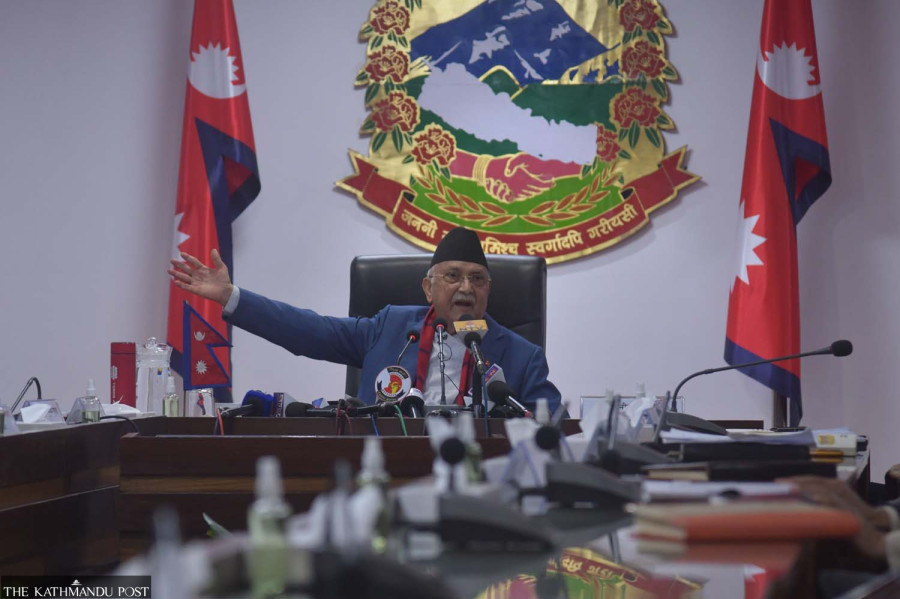Editorial
Take the lead, PM Oli
Rather than blame bureaucrats for government’s sub-par performance, he can show the way.
Prime Minister KP Sharma Oli was in a mood to give an earful to the over 50 government secretaries he had assembled at the staff college in Jawalakhel. Oli had decided to directly talk to the secretaries, the top functionaries in the bureaucracy, after the ministers in the federal Cabinet repeatedly complained of their difficulties in working with ‘uncooperative staff’. The staff at the ministries are apparently not delivering expected results. Talking to the top bureaucrats on Friday, Prime Minister Oli urged them not to shun their responsibilities by making excuses. One of the big complaints of the secretaries was that the bureaucracy was demoralised. If a flaw was found in the work they handled, the officials would have to shoulder all the blame. For instance, in nearly every big corruption case in Nepal, while most top political leaders who gave the final decisions were left off the hook, the officials lower down were prosecuted and jailed. Why this double standard, the secretaries asked? They also pointed to the frequent transfer of civil servants as another big hurdle to efficient service-delivery.
They make valid points. It is easy for the prime minister to lecture the civil servants on what they should do. But what has he, as the government head, done to help the civil servants? In fact, Oli as prime minister has been notorious over the years for frequently transferring top bureaucrats. When the secretaries and joint-secretaries are often transferred, and often within a matter of months, they don’t get the time to develop expertise in any area and thus can’t contribute much. They rather end up becoming unwitting pawns of their political masters. Prime Minister Oli—and other top political leaders—could also lead from the front. Despite the established link of the CPN-UML lawmaker and Parliamentary Accounts Committee chair Rishikesh Pokhrel to the embezzlement of the funds of a Biratnagar-based cooperative, Oli has been trying to shield him in various ways rather than facilitate free and fair investigation. The Nepali Congress leadership has similarly failed to take action against Nepali Congress Vice President Dhanraj Gurung, who too has been linked to a cooperative scam. Before this, during the time of the Pushpa Kamal Dahal government, while many officials lower in the decision chain were sent to jail in the infamous Lalita Niwas land-grab scam, former prime ministers Baburam Bhattarai and Madhav Kumar Nepal, who made the final decisions, were helped get clean chits.
This is not to suggest that the government officials are blameless. Most of them make every effort to dodge postings to remote areas. They tend to sit on files for months or years on end—either because they are afraid of making decisions or because they await kickbacks. Yet we believe that any substantive change must start at the top. If the head of the government and his Cabinet members are seen as clean and efficient, it is hard for the bureaucrats lower down to block the well-meant initiatives from the top. But when the politicians have one standard of conduct for themselves and another for the civil servants, it naturally galls on the latter. This is why, if Prime Minister Oli really wants to improve governance, he must demonstrate the moral authority to do so. Otherwise his words will continue to fall on deaf ears.




 11.16°C Kathmandu
11.16°C Kathmandu














